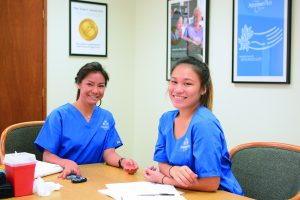 Home healthcare providers are often asked what makes a better caregiver. The answer is that, while many factors come to mind, an interest in learning is high on the list, and essential to a caregiver’s progress.
Home healthcare providers are often asked what makes a better caregiver. The answer is that, while many factors come to mind, an interest in learning is high on the list, and essential to a caregiver’s progress.
For example, an important role caregivers have is recognizing when an individual’s health condition is changing. Those who can reflect and learn from these changes often develop into better caregivers.
Caregiving for a family member can be challenging enough. But whether this occurs suddenly or as a gradual decline in health, caregivers can learn more and better themselves starting with some basic tips:
- Be healthy. Simply put, the healthier you are both mentally and physically, the better able you’ll be to pursue and provide care. This means eating healthy, staying active, and getting enough rest. When done consistently, caregivers have the energy to care for others and learn to avoid burn out.
- Get help. Sometimes, caregivers come across situations that are confusing or new to them. Perhaps their loved one is responding differently with their care routine. That observation could mean a condition needs more help from a medical provider. While asking for help can feel awkward for some, it’s a great way for caregivers to learn and make connections with what they see.
- Take courses. Look for free or low-cost courses in your area. There are many online courses that teach everything from caregiving techniques to self-care strategies that can be a part of your caregiving library. Many hospitals, home care agencies, hospice providers, caregiver support groups, and assisted living facilities also offer help in the way of seminars and workshops.
- Observe others. Sharing time with a more experienced caregiver is a great way to learn hands-on skills or another way of doing something. Since each person is different with their own set of circumstances, it helps to learn from others in a similar situation and share experiences.
- Support groups. Support groups can be a life force for caregivers. They provide mental, emotional, spiritual, social, and educational support needed for caregivers to continue doing what they’re doing and avoid burnout. Some support groups also provide respite and other resources to relieve a caregiver, allowing them to better reflect and process what is happening to them.
- Get rest. The busier you are the more important and vital rest becomes in a caregiver’s life. There is no other substitute for it and no one else can do it for you. Good caregivers make a plan for down time, to recharge themselves, and learn to protect that time from being encroached upon by others.
In healthcare, caregivers are always learning, adjusting their knowledge and skills, and adapting to new information. This occurs even when a caregiver becomes the one being cared for, and experiences things from a new perspective. By continuing an interest in learning new things and being flexible, a caregiver can better themselves and the quality of life for others.
ATTENTION PLUS CARE HOME HEALTHCARE
Accredited by The Joint Commission
1580 Makaloa St., Ste. 1060, Honolulu HI 96814
808-739-2811 | www.attentionplus.com
AGING IN HAWAII EDUCATIONAL OUTREACH PROGRAM by Attention Plus Care — a program providing resources for seniors and their families, covering different aging topics each month. For caregiver training and upcoming topics, call 808-440-9356.


Leave a Reply